"P.S. I Listened to your heart beat"
Personally signed by John Glenn, who served four terms as a U.S. senator from Ohio, and was one of NASA's original seven Mercury astronauts.
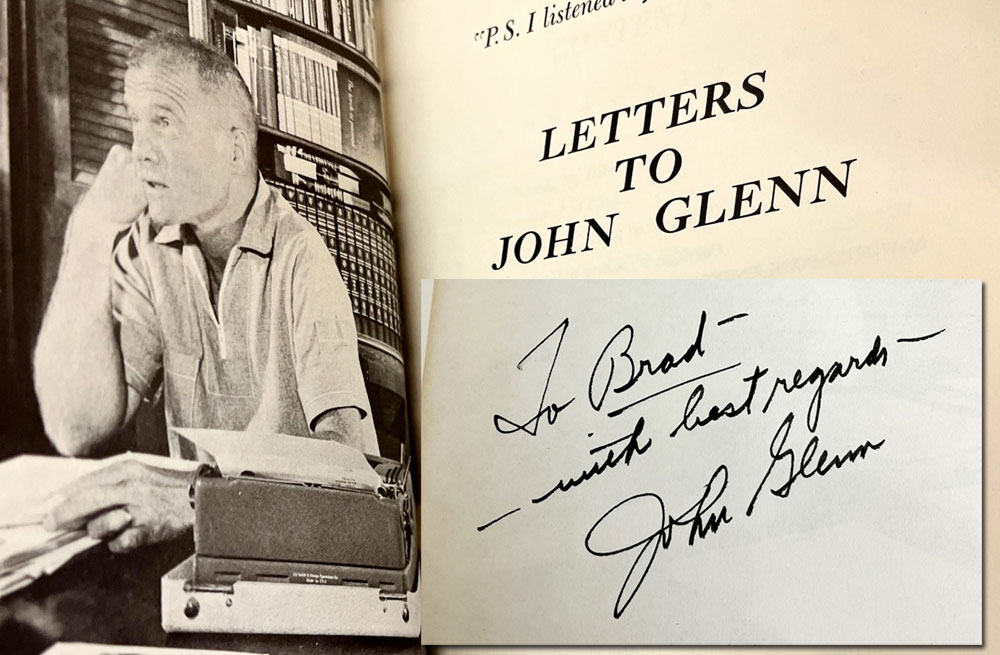
A highly sought after autograph. This wonderful collectible has been personally signed by John Glenn directly onto the title page of the book with a personal inscription:
"To Brad - with best regards - John Glenn"
Houston, Texas. World Book Encyclopedia Science Service 1964. John Glenn "P. S. I Listened to Your Heartbeat: Letters To John Glenn". Signed First Edition. Original dust-jacket with $14.95 price. Not price clipped. Personally signed by the author with a personal inscription onto the title page. Sky blue covered boards with gold graphics on front panel and gilt text on spine. Panels are clean and text is crisp. 248 pages. Hardcover book with original dust-jacket. Previous owner's address stamp on the signed page. Library of Congress Catalog No. 64-8471. Bookseller issued COA included.
This book gives you an interesting perspective on (primarily) American ideology during the Cold War/Space Race era. There are stories that are heartwarming, others which are critical, and some that are borderline crazy, but John's responses remain impartial throughout. The book is less about John Glenn and his experience on the Project Mercury spacecraft and more about the people watching a man orbit in space.
Letters to John Glenn
In the days before the internet, physical letters helped capture the pulse of what the public thought of its heroes. In 1964, John Glenn was the first astronaut to allow readers a glimpse of his fan mail when he published, “P.S. I Listened to your Heartbeat” Letters to John Glenn. The book came out sometime after Glenn left NASA. Soon after leaving the space program, Glenn had a serious fall. On 24 February 1964 while adjusting a heavy mirror, Glenn slipped on a throw rug on a slick bathroom floor causing him to strike the left side of his head. This affected the balance mechanisms near his left ear leaving him sensitive to head motions. Glenn was in the hospital for two months followed by additional months recuperating at home. Glenn had a lot of downtime to catch up on correspondence.
Published by Field Enterprises Educational Corp, the same folks who produced the World Book Encyclopedia, Glenn’s book was one of the products that emerged following the exclusive Time Life contract with the Mercury astronauts arranged by NASA. These early contracts allowed LIFE magazine and later Field Enterprises exclusivity in publishing the astronaut stories. This book presents some 422 excerpts from John’s Glenn’s mail. Printed anonymously, these were compiled from over 175,000 letters that Glenn received following his successful three-orbit Mercury spaceflight of 20 February 1962.
Glenn had charisma and politicians took notice, including then President Kennedy who encouraged Glenn to pursue political office, which he later did. People everywhere trusted and believed in Glenn. “I felt so drawn to him,” wrote an Apollo, Pennsylvania, man to Glenn’s parents. “He seemed like my own son.” A couple in LaCrosse, Washington, wrote the marine colonel. “Please forgive the American public for being a little silly and sentimental, but we needed a hero badly and you filled the bill far and above our wildest dreams.”
Tens of thousands of American wrote Glenn asking him for his favorite music (“I like many selections; music is the language of the emotions”); his favorite poems (“Your teacher may not thank me for suggesting this but try reading The Shooting of Dan McGrew”); his favorite hymn (“Be Still My Soul”); and his favorite Bible verses (Ecclesiastes 3:1-3 and Psalm 139:9-10). They also wrote him for his opinions of right and wrong (“Right, as a Hemingway character once said, is what you feel good after.”); his views on smoking (“It can apparently do no good and may do great harm—so why start?”); the relationship between science and religion (“Actually the more I learn in science the more I feel I am proving God’s existence.”); his favorite prayer (“God grant me the serenity to accept the things I cannot change, courage to change the things I can, and the wisdom to know the difference.”)
In addition to a foreword written by Glenn, his book is divided into 15 thematic chapters with introductions for each written by the astronaut. These include such titles as “On My Honor, I Will Do My Best…,” “The Hand of God,” “Fears, Wants—and Hopes,” and “‘P.S. About That Crate of Eggs.’” Almost all of the letters lack any attribution. Some are reproduced in their original typed or handwritten form.
The inside endpapers of the book contain a collection of postmarks, the result of one of the more unusual gifts received by Glenn. Shortly after his historic flight, Glenn received a big black notebook filled with over 175 postmarked envelopes from different towns across America. These were collected and assembled by a woman in Texas and placed in the proper sequence to tell the story of Glenn’s orbital Mercury flight: “Glenn Wake Early, Shook Sleepy-Eye. Felt Fine. Haddam Bath. Eaton Orange, Toast, Anmoore. Hima Hungry-Horse. Dresden Silver Overall. Combs Flat-Top Bald-Knob. Glendon Helmet…” well, you get the picture.
Those looking for information about Project Mercury will be disappointed as this is less about the mechanics of the space program and more about what people thought about Glenn and his first spaceflight. Glenn would return to space in 1998 when he flew aboard the Space Shuttle Discovery during the STS-98 mission. The book offers a glimpse of American ideology during the Cold War when the Space Race was heating up prior to Apollo 11. I note the book as being worth examining in comparison to the letters received by another astronaut who garnered great attention but handled his resulting fame much differently.
About John Glenn
John Herschel Glenn Jr. (July 18, 1921 – December 8, 2016) was an American Marine Corps aviator, engineer, astronaut, businessman, and politician. He was the third American in space, and the first American to orbit the Earth, circling it three times in 1962. Following his retirement from NASA, he served from 1974 to 1999 as a Democratic United States Senator from Ohio; in 1998, he flew into space again at age 77.
Before joining NASA, Glenn was a distinguished fighter pilot in World War II, the Chinese Civil War and the Korean War. He shot down three MiG-15s, and was awarded six Distinguished Flying Crosses and eighteen Air Medals. In 1957, he made the first supersonic transcontinental flight across the United States. His on-board camera took the first continuous, panoramic photograph of the United States.
He was one of the Mercury Seven, military test pilots selected in 1959 by NASA as the nation's first astronauts. On February 20, 1962, Glenn flew the Friendship 7 mission, becoming the first American to orbit the Earth, the third American and fifth person in history to be in space. He received the NASA Distinguished Service Medal in 1962, the Congressional Space Medal of Honor in 1978, was inducted into the U.S. Astronaut Hall of Fame in 1990, and received the Presidential Medal of Freedom in 2012.
Glenn resigned from NASA in January 1964. A member of the Democratic Party, Glenn was first elected to the Senate in 1974 and served for 24 years, until January 1999. Aged 77, Glenn flew on Space Shuttle Discovery's STS-95 mission, making him the oldest person to enter Earth orbit, and the only person to fly in both the Mercury and the Space Shuttle programs. Glenn, both the oldest and the last surviving member of the Mercury Seven, died at the age of 95 on December 8, 2016.
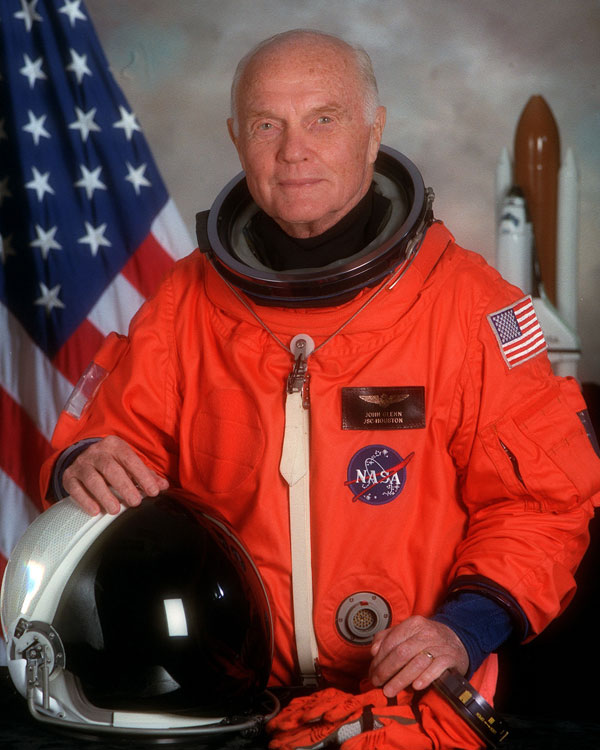
Near Fine dust-jacket with some chipping to edges as shown. Light stain on spine portion. Not price-clipped. The graphics appear bright and not faded. Photos of actual book. Very Fine without any flaws. The condition is of the highest quality without any flaws. Archival acid-free Mylar sleeve. Unread with square and tight spine. No bookplates attached or indication of any removed.
- Publisher:
- World Book Encyclopedia Science Service
- Edition:
- Signed First Edition
- Title:
- Letters To John Glenn
- Author:
- John Glenn
- Publication Date:
- 1964

















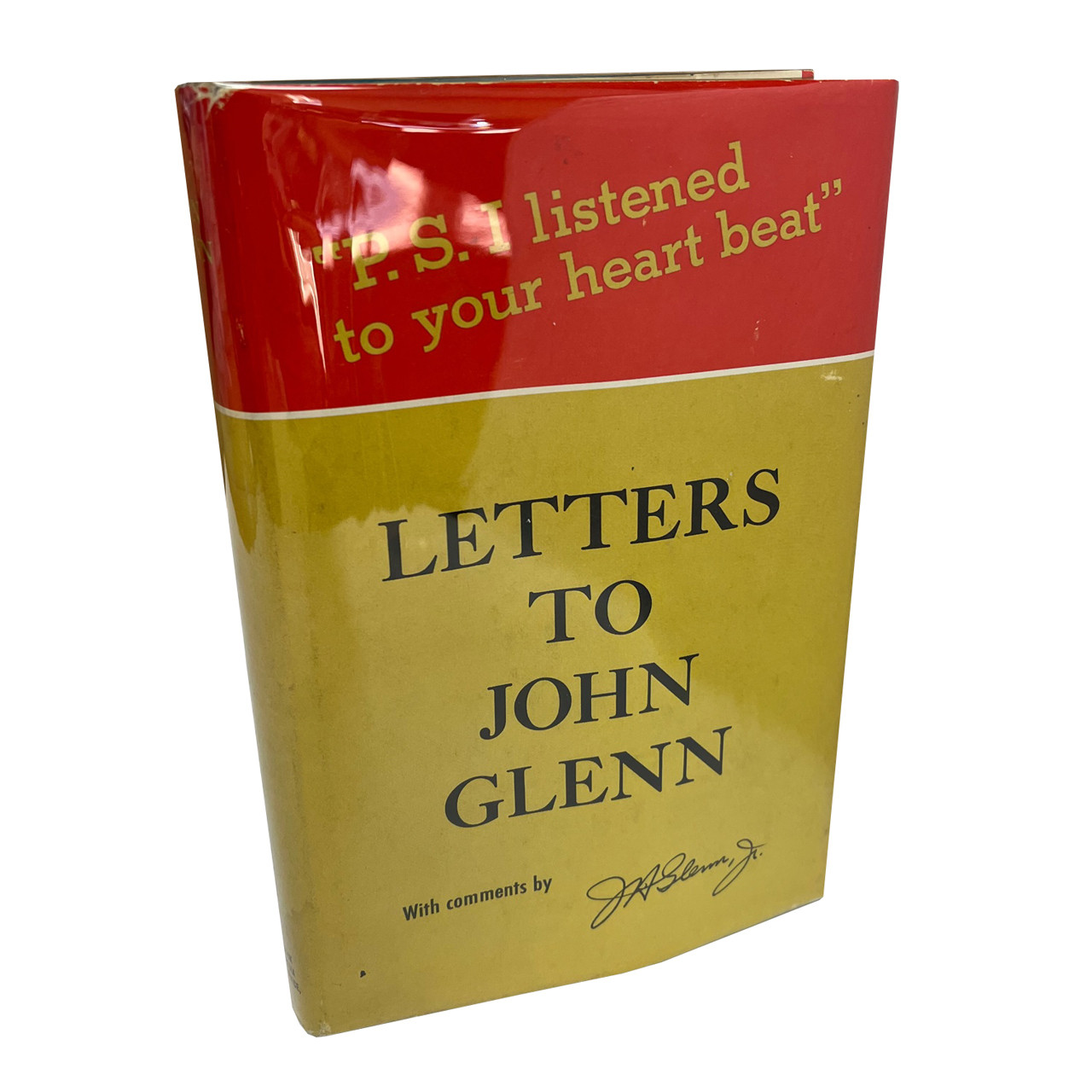






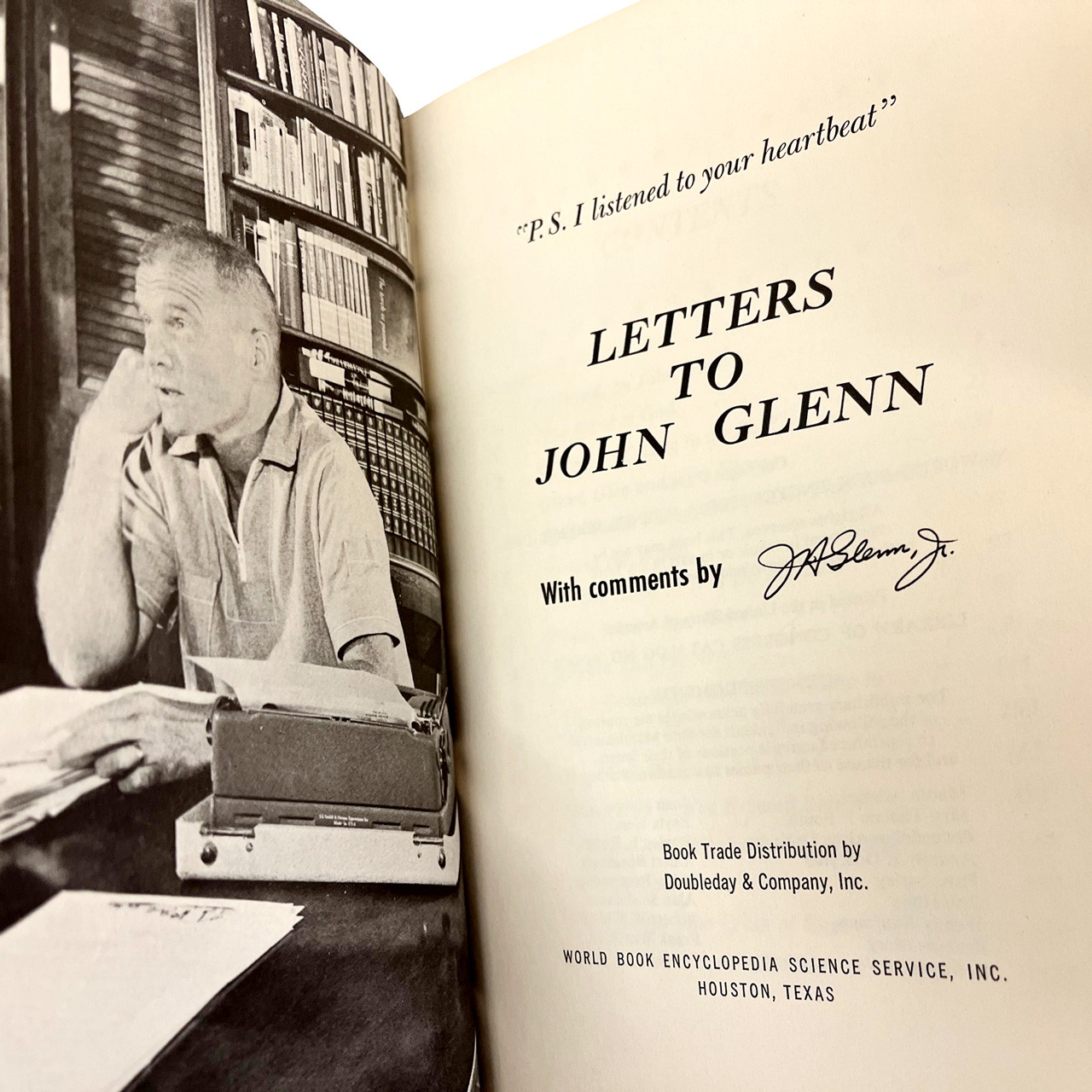

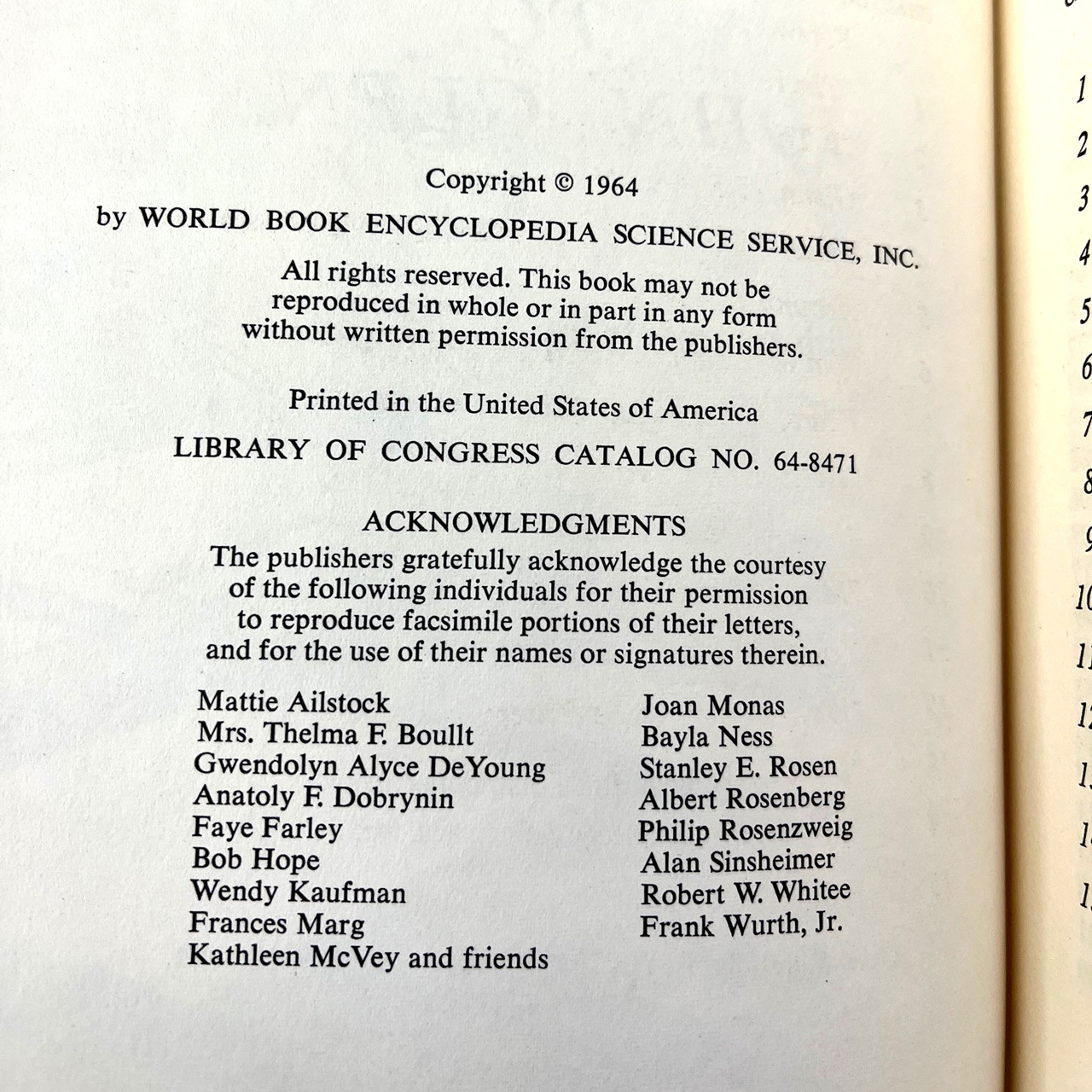
![John Glenn "John Glenn: A Memoir" Signed First Edition of 3,500 w/COA [Sealed] John Glenn "John Glenn: A Memoir" Signed First Edition of 3,500 w/COA [Sealed]](https://cdn11.bigcommerce.com/s-eohzfjch7f/images/stencil/500x659/products/453/15903/IMG_4098_John-Glenn__54386.1679310358.jpg?c=1)
![Carmen Bredeson "John Glenn: Space Pioneer" Signed First Edition, First Printing w/COA [Fine/Fine] Carmen Bredeson "John Glenn: Space Pioneer" Signed First Edition, First Printing w/COA [Fine/Fine]](https://cdn11.bigcommerce.com/s-eohzfjch7f/images/stencil/500x659/products/3001/14099/1280John-Glenn__36027.1666723457.jpg?c=1)
![Easton Press "We Seven" Scott Carpenter, Gordon Cooper, John Glenn, Signed Limited Edition w/COAs [Sealed] Easton Press "We Seven" Scott Carpenter, Gordon Cooper, John Glenn, Signed Limited Edition w/COAs [Sealed]](https://cdn11.bigcommerce.com/s-eohzfjch7f/images/stencil/500x659/products/398/1979/400-174-2__91845.1601670340.jpg?c=1)
![Olivia Newton-John "Livwise" Signed First Edition/ First Printing w/COA [Fine] Olivia Newton-John "Livwise" Signed First Edition/ First Printing w/COA [Fine]](https://cdn11.bigcommerce.com/s-eohzfjch7f/images/stencil/500x659/products/3372/26169/1280x1280__74910.1747040758.jpg?c=1)
![Easton Press "Global Paradox" John Naisbitt Signed First Edition w/COA [Sealed] Easton Press "Global Paradox" John Naisbitt Signed First Edition w/COA [Sealed]](https://cdn11.bigcommerce.com/s-eohzfjch7f/images/stencil/500x659/products/1058/4637/80-119-2__74663.1601671052.jpg?c=1)